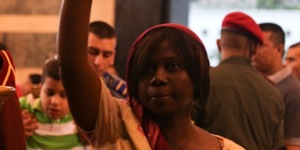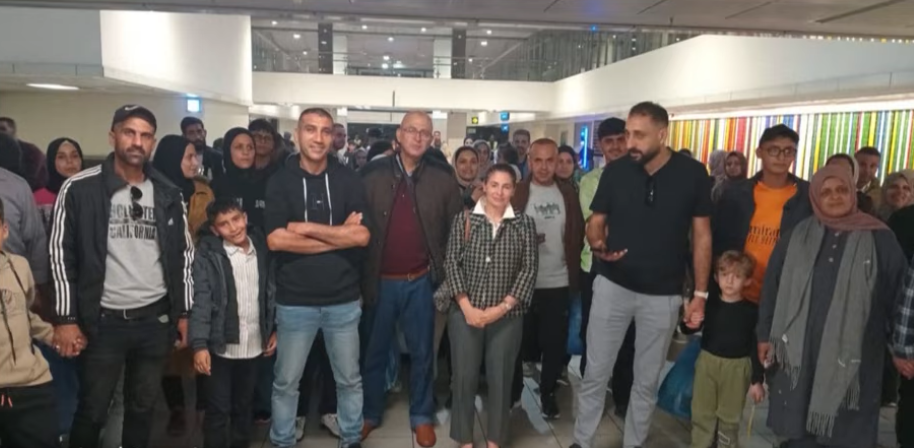‘I am somebody..’ mourner at Chavez’s funeral. Photo-Flickr
[The Liberators Series]
If you ask any African about Hugo Chavez he will likely hold him in the same esteem as Fidel Castro, or Che Guevara.
The first obvious reason would be the grassroots Bolivarian revolutionary movement. The second reason would be because he went against the grain of those before him.
Instead of shying away from his African heritage in favor of the Euro Spaniard heritage he fully embraced it, saying: ”Racism is very characteristic of imperialism and capitalism. Hate against me has a lot to do with racism. Because of my big mouth, and curly hair, Im so proud to have this mouth, and this hair, because it’s African.”
To take it a step further back Simon Bolivar, the great liberator, depicted in the Eurocentric sense most of the time, said: We are not Europeans; we carry an influential cross between indigenous, African, and European peoples. With this being said by the country’s founding father, I was compelled to dig deeper.
Upon my digging one finds out that the situation in Venezuela right now will not be told in its entirety, just as imperialist aggression in Libya was not shown; the killings of Black Libyans in Tawergha was whitewashed by the NATO-backed killers. Look at the “paradise” they’ve created in post-Quathafi Libya. Murderous anarchy reigns and is spread throughout North and West Africa.
To protect yourself as a citizen of the world, become informed by looking beyond the propaganda of White supremacist media outlets.
Venezuela has a history which is common in the Americas. The legacy of genocide, slavery and imperialist exploitation of land and the natural resources by the pro-Columbus conquistadors, are etched in the history books. Anytime there is an aggressive actions there is going to be a reaction.
This reaction came in the form of rebellions, and insurrections. Indigenous, and African enslaved cadres were the spearheads of these movements. In 1552 an enslaved African named Miguel rebelled and established a group of autonomous maroon guerrillas of Black, Mullato, and Indigenous ancestry, called a Cimarron. The biggest of these Cimarrons was founded by Guillermo Rivas in 1770. From this he would lead raids against the Spaniards and bring more of the oppressed into his ranks. Maroonage would further play a crucial role in the struggle for independence.
Simon Bolivar, although from a wealthy elite class, who actually had enslaved Africans waged armed struggle to free Latin America from the grip of Spanish colonialism. The formerly enslaved Africans swelled his ranks. One of them was Juana Ramirez. Born in 1790 she led an all-women battalion in 1813. Her fighting was so ferocious the nickname La avanzador, or the advancer, was given to her.
This remarkable fighter changed the perception of women and of African descendants.
Current Venezuelan president, Nicolas Maduro, has paid homage to Pedro Camejo, or Negro Primero, the first Black. This honorific was was due to his willingness to be the first on the battlefield and the last to leave. He was promoted to a lieutenant in Simon Bolivars army. In 1821 independence was gained and Venezuela became a nation. Unfortunately even with these illustrious figures in the country’s history, anti-Black stigma still would linger on.
Then came Hugo Chavez who translated his reformist ideas into action. Once elected in 1999 Hugo Chavez went against the Western-style grain and began working diligently to form his socialist, grass-roots embracing democratic republic.
Nothing happens overnight. Evolution is a constant thing. Chavez hit the ground running in vying for these changes. Chavezs reforms brought new laws against racism. For the first time intercultural education was imputed. On the national census the ability to identify as an Afro Venezuelan was added. New curriculum about Venezuelas African history was added to coursework in educational institutes. In the political realm Afro Venezuelans became way more involved in voting.
Even in Chavez’s administration more Afro Venezuelans were appointed as ambassadors and more became legislators. Under Chavez, Aristobulo Isturiz Almeida was education minister from 2001 – 2002; and, he came Venezuela’s first Black vice president from 2016 to 2017 under President Nicolas Maduro.
Chavez made it a priority to build relations with sister Africa. One way he did it was the opening 18 new embassies in African nations such as Mali, Congo, Angola, Burkina Faso, Benin, and others. Another way was offering scholarships to African students to study trades such as agriculture in Venezuela. Under this Bolivarian experiment a cohesive solidarity was on the rise between Africa and Venezuela.
Grenada, Libya, and now Venezuela have one thing in common. A small petite bourgeois group of people, never be satisfied even if given them the whole world on a plate undermine programs to benefit the grassroots. They invited ruin to Grenada and Libya.
These are bakers; they offer their countries as cake for imperialist powers to consume it all. As long as they are left with one slice they are satisfied; this usually represents 5% of the country’s wealth while outside powers and corporations control 95%.
White supremacy, racism, and neo-Nazism are usual characteristic of this backlash. We see the continued plight of Black Libyans that started when reactionary Arab renegades ousted Quathafi whose vision was Africa-centered.
It is no different in Venezuela today. How do we account for the burning by anti-government demonstrators of a 21 year old Afro Venezuelan, Oscar Figuera, simply for identifying as a Chavez supporter? The anti-Bolivarian opposition is also anti-Black.
These are the stories you dont hear about during these peaceful opposition protests; just as few knew about the lynching of Black Libyans and ethnic cleansing of Tawergha and other abuses due to the media blackout except for a few outlets.
This opposition is really no different than the Right-wing that supports President Donald Trump and here in America they include Neo-Nazis and the KKK.
Africans must support societies that wish to correct historical wrongs against those of African ancestry.






